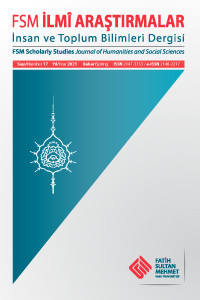Kural, Anlam ve Yorum Üçgeninde Wittgenstein
Kural; Yorum; Analitik; Anlam; Hukuk; Uygulama
Wittgenstein in the Cross of Rules, Meaning and Interpretation
___
- Baker, G.P. - Hacker, P.M.S. , An Analytical Commentary on the Philosophical Investigations, Volume 2, Wittgenstein, Rules, Grammar and Necesssity, Blackwell Publishers, Oxford,1997.
- Berki, Ali Himmet, Açıklamalı Mecelle, Hikmet Yayınları, İstanbul, 1990. Bix, Brian, “The Application (and Mis-Application) of Wittgenstein’s Rule Following Considerationsto Legal Theory,” Wittgenstein and Law, Edt., Dennis Patterson, Ashgate, England, 2004.
- Bloor, David, “Kurumlar Olarak Kurallar,” Çev.: Kemal Atakay, Cogito, Sayı 33, YKY Yayınları, İstanbul, 2002.
- Cowan, Joseph L., “Wittgenstein’s Philosophy of Logic,” The Philosophical Review , Volume 70, Issue 3, ( Jul., 1961).
- Eisele, Thomas D., “The Activitiy Of Being of A Lawyer: The Imaginative Pursuit Of Implications and Possibilities,” Wittgenstein and Law, Edt., Dennis Patterson, Ashgate, England, 2004.
- Gözler, Kemal, Türk Anayasa Hukuku Dersleri, Ekin, Bursa, 2012.
- Greisch, Jean, Wittgenstein’da Din Felsefesi, çev. Zeki Özcan, Asa, Bursa, 1999.
- Hacker, P.M.S., An Analytical Commentary on the Philosophical Investigations,Volume 4, Wittgenstein: Mind and Will, Part I: Essays, Blackwell Publishers, Oxford, 2000.
- Hadot, Pierre, Wittgenstein ve Dilin Sınırları, çev. Murat Erşen, DoğuBatı, Ankara, 2011.
- Janik, Allan. &Toulmin, Stephen, Wittgenstein’ın Viyanası, çev. Hüsamettin Arslan, Paradigma, İstanbul, 2008.
- Kripke, Saul A., Wittgenstein, Kurallar ve Özel Dil, çev. Berat Açıl, Litera Yayıncılık, İstanbul, 2007.
- Lind, Douglas, “Constutional Adjudication as a Craft-Bound Exellence,” Wittgenstein and Law, Edt., Dennis Patterson, Ashgate Publishing, England, 2004.
- Morawetz, Thomas, Law’s Premises, Law’s Promise, Jurisprudence after Wittgenstein, Ashgate, Hampshire, 2000.
- Morawetz, Thomas, “Understanding Disagremeent, The Roots Issue Of Jurisuprudence: Applying Wittgenstein To Positivitism, Critical Theory And Judging,” Wittgenstein and Law, Edt., Dennis Patterson, Ashgate, England, 2004.
- Patterson, Dennis, “Introduction”, Wittgenstein and Law, Edt., Dennis Patterson, Ashgate, England, 2004.
- Patterson, Dennis, “Normativity and Objectivitiy in Law”, Wittgenstein and Law, Edt., Dennis Patterson, Ashgate, England, 2004.
- Sebok, Anthony J., “Finding Wittgenstein at the Core of the Rule of Recognition, Wittgenstein and Law, Edt., Dennis Patterson, Ashgate, England, 2004.
- Stone, Martin, “Focusing the Law: What Legal Interpretation is Not,” Wittgenstein and Law, Edt., Dennis Patterson, Ashgate, England, 2004.
- Utku, Ali, Ludwig Wittgenstein, Erken Döneminde Dilin Sınırları ve Felsefe, DoğuBatı, Ankara, 2009.
- Wittgenstein, Ludwig, Defterler 1914-1916, çev. Ali Utku, Birey, 2004. Wittgenstein, Ludwig, Zettel, çev. Doğan Şahiner, Nisan Yayınları, İstanbul, 2004.
- Wittgenstein, Ludwig, Estetik, Ruhbilim, Dinsel İnanç Üstüne Dersler İle Söyleşiler, Der.; Cyril Barett, çev. Abdülbaki Güçlü, Bilim ve Sanat, Ankara, 2004.
- Wittgenstein, Ludwig, Renkler Üzerine Notlar, çev. Ahmet Sarı, Salkımsö- ğüt, Erzurum,2007. Wittgenstein, Ludwig, Felsefi Soruşturmalar, çev. Haluk Barışcan, Metis Yayınları, İstanbul, 2007.
- Wittgenstein, Ludwig, Mavi Kitap-Kahverengi Kitap, çev. Doğan Şahiner, Türkiye İş Bankası Kültür Yayınları, İstanbul, 2007 Wittgenstein, Ludwig, Tractatus Logico-Philosophicus, çev. Oruç Aruoba, Metis, İstanbul, 2008.
- Zapf, Christian- Moglen, Eben “Linguistic Indeterminacy and the Rule of Law, On the Perils of Misunderstanding Wittgenstein,” Wittgenstein and Law, Edt., Dennis Patterson, AshgatePublishing, England, 2004.
- ISSN: 2147-3153
- Başlangıç: 2012
- Yayıncı: Fatih Sultan Mehmet Vakıf Üniversitesi
Özü Yüzden Okumak: Büyük Doğu’nun Kapakları Sempozyumu
Vefatının 20.Yılında Sâmiha Ayverdi’nin İstanbul’u Sempozyumu
Enfel Doğan, Şeyhoğlu Sadrüddin’in Kabus-Nāme Tercümesi: Metin, Sözlük, Dizin, Notlar, Tıpkıbasım
Konformizm-Nonkonformizm Açısından Edip Cansever’in Şiiri
Atlansoy’un “Su Burcu”nda Metinlerarasılık II
Molla Muhammed Timur’un Çağatayca Kelile ve Dimne Tercümesi
Ömer Seyfettin’in “Fon Sadriştayn’ın Oğlu” Adlı Hikâyesi Çerçevesinde Yeni Lisan Hareketi
